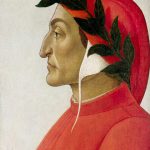Now mind is clear
as a cloudless sky.
Time then to make a
home in wilderness.What have I done but
wander with my eyes
in the trees? So I
will build: wife,
family, and seek
for neighbors.Or I
perish of lonesomeness
or want of food or
lightning or the bear
(must tame the hart
and wear the bear) .And maybe make an image
of my wandering, a little
image—shrine by the
roadside to signify
to traveler that I live
here in the wilderness
awake and at home.
I am intrigued and captivated by this poem, though I admit that (as with many Ginsberg poems) I find it difficult. I think the poet is exploring the idea of a life lived in harmony with nature, as opposed to a conventional life – perhaps city life? – within modern Western society. Allen Ginsberg was an avid student of Buddhism (he even founded his own school based on its principles), and I think there are clear influences of that interest in this piece.
The opening stanza describes a state of mind, “clear/ as a cloudless sky”. In this state of peace and calm, the poet decides it is “Time then to make a/ home in wilderness”. These two lines suggest that when the poet’s mind is uncluttered by the mess and bustle of life within the confines set out by society (i.e. in a state of meditation?), his overriding desire is to live in the “wilderness” – in the purity of nature – abandoning ego, ambition and material greed. The poet’s desire to live in the “wilderness” also reflects the way in which Ginsberg masterfully rebelled against the inherited conventions of poetry, abandoning strict form and permitting himself the colloquial and sometimes even vulgar diction, and of course taboo subjects such as sex, homosexuality, racism etc.
“What have I done but/ wander with my eyes/ in the trees?” asks the speaker in the second verse. I think Ginsberg is saying here that this is all he has been seeking throughout his life — searching the horizon, the wilderness, for a way in (or a way out!) He says that he will “build” a home there, in the wilderness, with “wife”, “family” and “neighbours”. For me, there is a sort of self-conscious acknowledgement here that – however much he longs to separate himself from the trappings of conventional society – he is always applying society’s measures – its mores and norms – to the ‘free’ life he is seeking in the “wilderness”. Even here, he seeks to furnish his new home with the usual “wife”, “family” and “neighbors” that signify success in the Western world’s terms. Likewise, perhaps, even as free as the Beat poets seemed from literary convention, they doubtless still felt the weight and draw of it at times.
As we move into the third stanza, the poet begins to contemplate the possible failure of his dream home. He imagines that he might “perish of lonesomeness”, “want of food”, “lightning” or “the bear”. These fears are very intriguing. He is afraid that his ‘pure’ life in nature might cause him to die from loneliness, hunger (that is man’s greed). The lightning I think might refer to love (the coup de foudreor lightning bolt) and the bear of course signifies the dangers of the untamed natural world. Ginsberg adds at the end of this stanza, in brackets, that he must “tame the hart” and “wear the bear”. This implies that he realises he must tame the wild creatures in order to be safe (or even to eat), and kill in order to defend himself. There must be destruction, murder – a desolation – for man’s survival.
In the final verse, the speaker tells us that he wishes to leave a trace of himself in his wilderness. Man has always told stories, left an imprint of himself, from the time he lived in caves. It’s a natural, human impulse. Ginsberg talks of a little “shrine by the roadside”, so that travellers might know that he lives there in the wilderness, “awake and at home”. He is determined to pursue his ‘pure’ and ‘natural’ life, and he will leave a small trace of it for other pilgrims. This “shrine by the roadside” is surely a symbol for Ginsberg’s poems, which are beacons of this incredible poet’s courage and genius – a signpost for other poets seeking the same freedom.
Reviewed by Emily Ardagh



